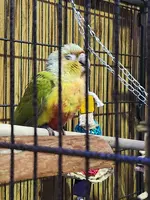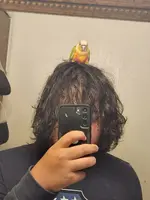4 days ago, I adopted a baby/very young Green Cheek. The breeder gave me some formula, taught me how to feed and practically sent me on my way. As of now my messages are no longer being responded to and I can't find info anywhere. I'm not aware of its age, but it is almost completely fully feathered besides a small patch under its beak. It also seems to be in the beginning stages of fledging. It can fly to me almost no issue from across my room. It cannot yet drink water, and barely eats the food mix/millet. However I hand feed the baby 3 times a day, and it eats roughly 5-8 ml per meal. It is very sweet and affectionate, and loves to be around people and cuddle. I would just like some help estimating age, and getting tips for feeding/weaning, and things of that nature. Also if it's normal for it to chirp 24/7 unless sleeping or beak grinding
Navigation
Install the app
How to install the app on iOS
Follow along with the video below to see how to install our site as a web app on your home screen.
Note: This feature may not be available in some browsers.
More options
Style variation
- Aug 29, 2018
- 27,801
- 39,636
- Parrots
- Fang ({ab}normal grey cockatiel), Valentino (budgie), Jem (cinnamon cockatiel), Lovejoy(varied lorikeet), Peach (princess parrot)
Welcome to the forums, @AJReyes, I'm so sorry that breeder has left you and your little one in this position. I've just moved your thread to our "Breeding and Raising Parrots sub-forum, and there are a number of "stickies" at the top of this forum that may be of assistance to you, most notably the one called "So You Bought An Unweaned Baby" by @SilverSage. I've extracted what i hope will be some helpful info from it for you to read ...4 days ago, I adopted a baby/very young Green Cheek. The breeder gave me some formula, taught me how to feed and practically sent me on my way. As of now my messages are no longer being responded to and I can't find info anywhere. I'm not aware of its age, but it is almost completely fully feathered besides a small patch under its beak. It also seems to be in the beginning stages of fledging. It can fly to me almost no issue from across my room. It cannot yet drink water, and barely eats the food mix/millet. However I hand feed the baby 3 times a day, and it eats roughly 5-8 ml per meal. It is very sweet and affectionate, and loves to be around people and cuddle. I would just like some help estimating age, and getting tips for feeding/weaning, and things of that nature. Also if it's normal for it to chirp 24/7 unless sleeping or beak grinding
1) TEMPERATURE IS EVERYTHING! Temperature is the most important part of raising a healthy baby parrot; the temperature of the formula and the temperature of the living environment.
-Formula MUST be between 104 degrees Fahrenheit (40 degrees Celsius) and 110 degrees Fahrenheit (43.3 degrees Celsius). Any cooler and not only will your baby likely reject the formula, but his body will be unable to digest it properly leading to malnutrition. In some cases the food, not being digested, can even begin to spoil inside the body and from there you quickly see a spiral into bacterial infections that can kill within a few hours of the first symptoms. If the formula is too hot you risk internal burns. Unlike human babies, parrot chicks may not initially show signs of discomfort if the formula is too hot; they may swallow an entire feeding only to have their throats and crops severely burned to the point of being life-threatening. Even if the birds don't kill the bird outright they open them up to nasty infections that can kill very quickly, often before the new owner can even notice symptoms.
-The living environment temperature depends on how many chicks, how old, etc, but the baby needs to be kept warm enough for their body to function normally as if a mother bird was constantly brooding him. For a baby that is not fully feathered this us usually between 96 degrees Fahrenheit (35.6 degrees Celsius) and 99 degrees Fahrenheit (37.2 degrees Celsius). If the baby is standing upright, panting, and holding the wings out from the body he is too hot. If a group of babies is piled on top of each other, they are too cold. You want a temperature where babies can sleep comfortably without needing to crowd together or stand up and pant. It is more difficult with a single baby, so lean toward too warm rather than too cold. Start at the high end and only turn it down if the baby seems too warm. Remember, the baby should have clutch mates and/or parents to snuggle with and alone in your home he cannot regulate his own body temperature. If he isn't kept warm enough his organs cannot function properly and you open him up to many complications such as slow crop leading to bacterial and fungal infections and rapid death.
2) TIMING MATTERS! It is important that your baby be fed often enough. Generally speaking (and this is VERY GENERAL, different species have different needs) babies who don't have a full covering of feathers yet should be fed about every 4 hours during the day, and can go 8 hours over night after about 3-4 weeks. Once they have that covering of feathers they can start going 6-7 hours between daytime feedings. Trying to cram too much food into the crop does stretch it an enable the baby to take more food at a time but can lead to problems with sour crop, crop stasis, etc all leading to (can you guess?) bacterial and fungal infections that can kill your baby overnight. Going too long between feedings can also have a negative impact on the psychological development of the little guy.
3) FORCE WEANING IS CRUEL! Force Weaning is when you reduce the amount of formula you are feeding and make the baby fill up on solid foods. Sounds normal, but is actually very damaging and contributes to all sorts of emotionally damaged behaviors like biting, screaming, plucking, phobias, cage aggression - the list goes on. The proper and humane method of weaning a baby parrot is Abundance Weaning. This method is simple: You keep offering the formula until the baby decides HE doesn't want it anymore for at least 5 days in a row. Guess what? Knowing that the formula is coming actually gives the baby is very firm foundation from which he can venture forth and explore. Just because the baby has started trying solid foods does not at all mean he is ready to lose the formula. Keep offering it until the baby decides he doesn't want it.
4) EARLY CLIPPING IS DANGEROUS! I'm not going to get into the pros and cons of clipping an adult bird but it is VITAL to the physical and mental development of young parrots that they be allowed to LEARN TO FLY. And I don't mean "get their first few flights", I mean they need to become FLYING EXPERTS. Yes, it is scary for you to watch them crash, but this is the appropriate age where their minds and bodies are prepared for and eager to learn these skills. Even if you plan to clip your bird they NEED this time to gain crucial mental skills such as how to react to new things, how to avoid danger, etc. Not to mention they need to learn the skill of flying DOWN. That's another heartbreaking situation I get asked to help with a lot. So many escaped parrots WANT TO COME HOME but can't because they never learned the complex skill of flying downward. But that is a whole different topic. Another reason it is absolutely crucial to allow baby birds to keep their flight feathers is for balance. The crop is right there on the front of their body and if they are crashing to the ground on it because their flights are clipped, they can force themselves to vomit and aspirate. On that note, "play time" should be before feedings, not after, for the exact same reason; you don't want to be bumping a full crop.
Ok folks! That is by no means a guide to a well rounded parrot, but it should at least help you hopefully keep your baby alive. If you see ANY signs of illness such as lethargy, difficulty breathing, refusal to eat, disorientation, dull eyes, nasal discharge, failure to empty crop, etc, contact an Avian Vet immediately. You should have one on speed dial now."
There will be many other posts within that thread that might help you too, as I am personally not familiar with handfeeding baby parrots so I recommend you read the whole thread.
So you bought an unweaned baby...
Today I spent several hours trying to help someone save a baby bird they had purchased unweaned. The baby died; they are usually almost dead by the time the new owner realizes something is wrong, not because the owner doesn't care but because they are not educated about what to look for or...
www.parrotforums.com
Hopefully another member who DOES have hand raising experience will be able to help you soon too, and I wish you and your baby conure all the very best!!
Similar threads
- Replies
- 2
- Views
- 630
- Replies
- 1
- Views
- 1K
- Replies
- 2
- Views
- 849
- Replies
- 1
- Views
- 756


